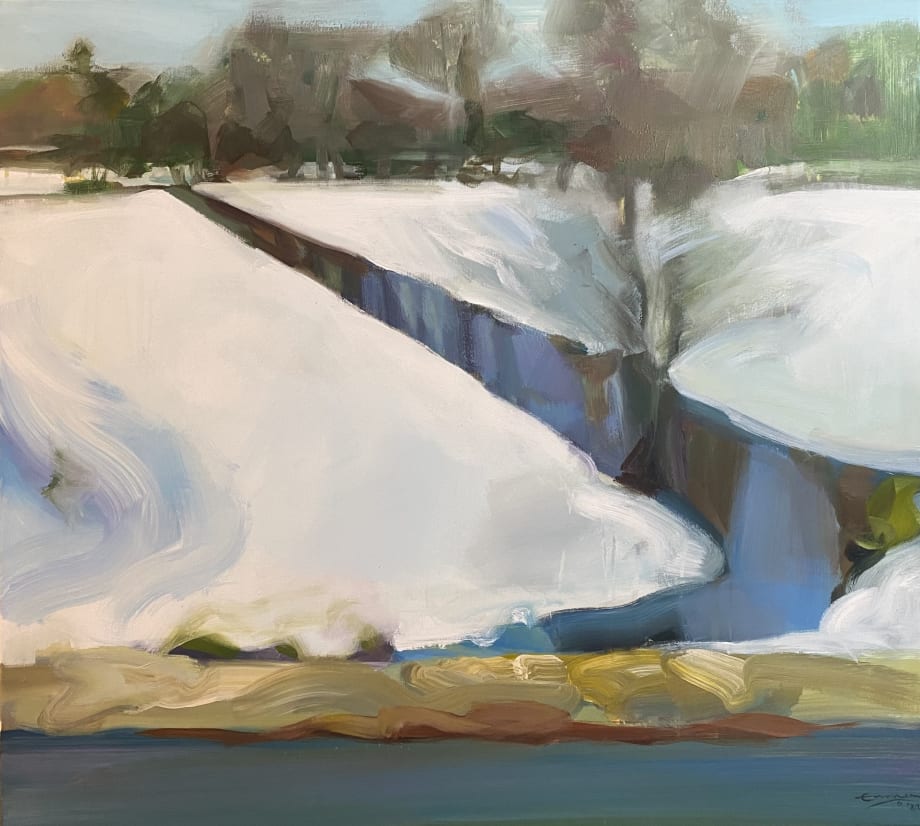This act of summarising the landscape, containing it in a frame, could be viewed as part of a process of colonial subjugation akin to map making (albeit with far less devastating consequences). After all, landscapes themselves contain the histories of their geology, as well as the humans, animals, insects, plants and weather systems that have created them. When an artist paints a landscape, they are recording that history and – at the same time – fusing it with their own personal stories.
Foreign Lands brings together the work of two artists from the African continent: Ermias Ekube, Ethiopian born Eritrean, and Eric Pina, Senegalese, now resident in Sweden and Germany respectively. Touching on issues of assimilation as well as notions of identity and cultural “ownership”, the exhibition explores ideas of encounter and environment, considering how the “foreign” landscapes absorbed and manifested through each artist’s practice tell stories about their own past and current realities.
Staging a dialogue between two practices, produced alongside a written artists' in-conversation, Foreign Lands is equally in conversation with its own setting. The exhibition takes place in the centre of London, a city famous for its fusion of cultures and dotted with architectural history where landscape has been obliterated and reconstituted over time.
Overlaying those foundational considerations is the relationship between figure and landscape; in the context of the exhibition, Pina’s compelling and enigmatic sculptures are stripped of their situational settings. Meanwhile, Ekube’s semi-abstract landscape canvases answer the call of Pina’s figures with an equal and opposite silence: achingly empty, sprawling vistas hovering just out of focus.
While “foreign lands” have historically been subject to the confining impulse of explorers and colonisers, the figures and landscapes in Foreign Lands are unbounded; untethered from considerations of setting, Pina’s figures wander the gallery as they please, and Ekube’s unframed landscapes imply their own expansiveness beyond the limits of canvas.
----------
Ermias Ekube (b. 1970, Addis Ababa, Ethiopia) studied at the Addis Ababa School of Fine arts and Design, graduating in 1990. He lives and works in Kalmar, Sweden. Merging figurative and conceptual strands, Ekube’s work draws on thoughts and memories to imbue stories with meaning via simple objects, signs and gestures. Selected solo exhibitions include The process of changing a meaning that matters or not, Oskarshamn Kulturhuset, 2019; Do Lives Matter?, Malhuset, Oslo, Norway, 2016-17; Glimpse of Time, Addis Ababa, Ethiopia, 2015; between Times, Västervik, Sweden, 2015; Porträtt Från Min Kappsäck, Västervik, Sweden, 2014 and Breath of consciousness, Nairobi, Alliance Francaise, 2013. Group exhibition highlights include African Artists for Development, Vienna, 2017; Far & Near, Pontasieve and Bergamo, Italy, 2012, and Engraving from Eritrea, Paris and Milan, 2004.
Eric Pina (b. 1972 Thies, Senegal) studied at l’Ecole Nationale des Beaux-Arts in Dakar before completing his training in Europe where he received a degree from l‘Ecole Supérieure d’Art de Mulhouse et de Haute-Alsace in Mulhouse, France. Focusing on human body language and the micro interactions between people and cultural backgrounds, Pina’s practice comprises painting and drawing as well as printmaking and sculpture. Imagining intimate, parallel universes that opportune a multitude of scenarios and ‘small’ moments, a Pina composition amasses an unlikely group of citizens in what appears to be an ambiguous waiting game; despite their diverse material incarnations, his figures maintain an emblematic presence even when removed from their context or isolated from a given journey or task. Pina was selected for exhibition at Dak’Art Biennale of Contemporary African Art in Dakar, Senegal, in 2014, and has had solo presentations in Germany, Switzerland, Canada, and France.


